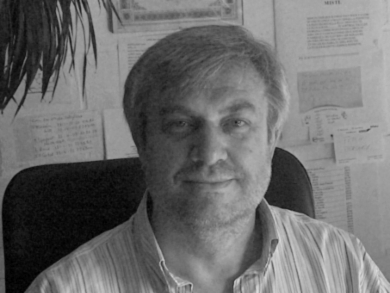Those who were privileged to study with István Markó celebrated his pedagogic talent and his ability to captivate and enthrall the novice chemistry student. Those who met him in other contexts would highlight his legendary story-telling skills and charismatic eloquence. On July 31, 2017, István Markó unexpectedly passed away at the age of 61.
A Fondness for Complex Molecules
István E. Markó was born in 1956 in Papa, Hungary. A few months later his family immigrated to Belgium at the dawn of the Hungarian Revolution of 1956. He graduated from the Université catholique de Louvain, Belgium, in 1978, working for his final year research project under the guidance of Léon Ghosez on prostaglandin synthesis. He then embarked on a Ph.D. in the same lab and tackled the semi-synthesis of tricyclic penicillins. After defending his thesis in 1983, he prolonged his stay in the Ghosez group for two years as a postdoc, investigating intermolecular keteniminium cycloadditions.
His fondness for the assembly of complex molecules then drove him to cross the Atlantic and to join the research group of Martin Kuehne at the University of Vermont, Burlington, USA. There, he would work on the total synthesis of monoterpene indole alkaloids and binary Vinca alkaloids. After two years in Vermont, he moved to the Massachusetts Institute of Technology (MIT), Cambridge, USA, to join the group of Barry Sharpless, where he was involved in the team that developed the catalytic asymmetric dihydroxylation of olefins.
Unforgettable Lectures
He returned to Europe in 1988 to take a Lecturer position at the University of Sheffield, UK. He stayed in the UK for 5 years before becoming Full Professor at his alma mater, the Université catholique de Louvain. There, he directed the Laboratoire de Chimie Organique et Médicinale and taught organic chemistry to several generations of students. His unforgettable lectures became something of a cult among chemistry students, as he would conduct spontaneous polls on which particular hydrogen should be preferentially deprotonated, or initiated extensive detours into advanced topics before returning to the theme at hand, or even demonstrated the difference between a Hückel or a Möbius system by borrowing a belt from a perplexed student in the first row.
In Louvain, he quickly assembled a large team of international researchers focussing on the development of new synthetic methodologies. Notable among them were the catalytic aerobic oxidation of alcohols, the Pt-catalysed hydrosilylation of alkenes and alkynes, or the development of the intramolecular silyl-modified Sakurai (ISMS) reaction—but a distinctive feature of Markó’s research was the incredible breadth of topics covered. As the authors were graduate students in the team, topics ranged from fundamental organometallic studies to pioneering work on the electrochemistry of carboxylic acids and esters, passing by several total syntheses of complex natural products!
Honors and Awards
István Markó was a Member of the Hungarian Academy of Sciences and is the recipient of many awards, such as the Triennial Prize of the Belgian Royal Chemical Society. Over the years he developed strong ties with chemical and pharmaceutical companies across Europe; he was the recipient of numerous Merck Academic Development Program Awards and served on the Scientific Board of Rhodia for 20 years.
He graduated more than 65 Ph.D. students and supervised nearly 40 postdocs, several of whom now hold leading positions in universities and companies across the globe. His encyclopedic memory, his presence of thought, his refined sense of humor and his kindness have greatly enriched the lives of those who shared his company. He is survived by his wife, Patricia, and two children, Imre and Aurelia. We will miss István E. Markó.



![Synthesis of [c2]Daisy Chains via Mechanochemistry](https://www.chemistryviews.org/wp-content/uploads/2025/04/202504_RotaxanesWithSolidStateMechanochemistry-125x94.png)
